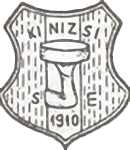Chinezul Timişoara
 |
|
| Full name | Chinezul Timișoara |
|---|---|
| Founded | 1910 |
| Dissolved | 1946 |
| Ground | Banatul |
| Capacity | 7,000 |
Chinezul Timișoara (Hungarian: Temesvári Kinizsi) was a football club, which played both in the Romanian and the Hungarian championship during its existence. It was based in Timișoara, Romania (at the time of foundation Temesvár, Austria-Hungary).
The club was established in 1910 under the name Temesvári Kinizsi SE with the support of the local Rail Workers' Association. It was named after Pál Kinizsi, a general in the army of king Matthias Corvinus and Comes of Temes. The crest of the club also reflected to it, as it featured an arm holding a mill stone. This was related to old Hungarian folk tales which stated that Pál Kinizsi was a very strong miller who was able to hold the mill stone with one hand. The team played its first ever match on 6 May 1911 against the Temesvári Atléták.
Kinizsi entered the Hungarian league system in 1911, playing in the Southern division of the territorial championship. They went triumphant three times, having won the title in 1914, 1917 and 1918.
Following the World War I the city became the part of the Kingdom of Romania and the club was renamed to Chinezul Timișoara, which is the Romanian equivalent of the former name of the team (Pál Kinizsi is known as Pavel Chinezul in Romanian).
The team's colours were white and violet and it played at the Banatul Stadium which was opened on October 13, 1913. Nowadays this stadium, which can hold a crowd of 7,000 people, is being used by the Liga II team, CFR Timișoara.
In Romania Chinezul Timișoara is most famous for its record 6 consecutive national title wins between the 1921–22 and 1926–27 seasons. This record has only been matched 71 years later by Steaua Bucureşti.
...
Wikipedia
